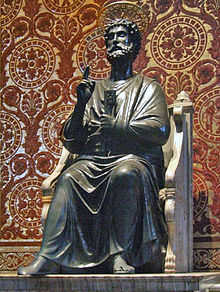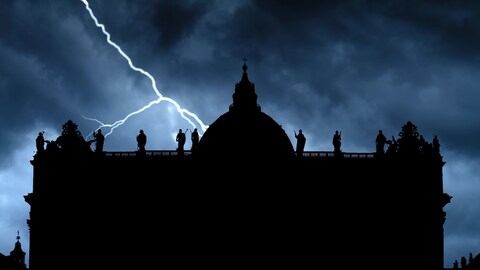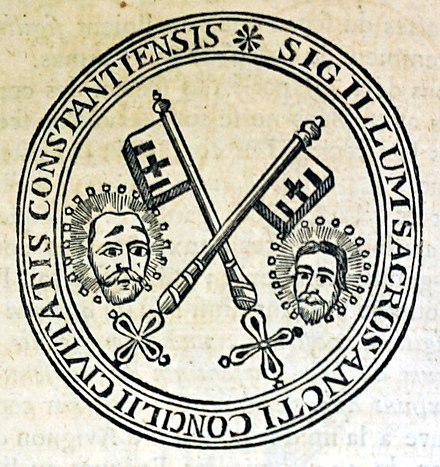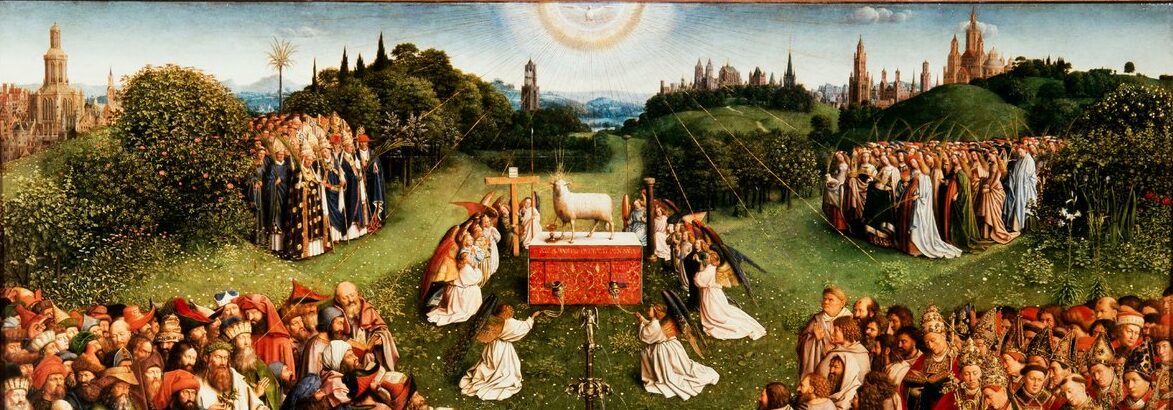A pope can become an heretic and loose his papacy
Let us make a distinction between two infallibilities :
According to the Holy Scripture, the infallibility of the pope comes from the promise of Our Lord: “18 And I tell you, you are Peter, and on this rock I will build my Church..”.
But a second promise of Our Lord follows immediately and gives infallibility to the Church: “…I will build my church, and the gates of hell shall not prevail against it.“.

The infallibility of the pope is “active” by the E.U.M. (Extra ordinary Universal Magistry) : he is the Teacher, the Magister, and by the O.U.M. (Ordinary Universal Magistry).
The infallibility of the Universal Church is “active” in its Magistry (O.U.M.) and “passive” in its faith, believing the teached Revelation.
The pope can loose his papacy by public heresy. It happened for the first time when Paul VI published the document “Lumen Gentium” at the 21st of November 1964, see my document about this matter, and see here lower in “italics” ).
But the Church can never be heretical, there will always be a “little rest” with the true faith, nowadays it are the Sedevacantists catholics, because of the promise of Our Lord “that the Church wil not be overcome by the hell and its lies”.

“A pope looses his papacy by one public heresy”, has been proved by, for example, Doctor of the Church Cardinal Saint Bellarmine : “Now the fifth TRUE opinion, is that a Pope who is a manifest heretic, ceases in himself to be Pope and head, just as he ceases in himself to be a Christian and member of the body of the Church: whereby, he can be judged and punished by the Church. This is the opinion of ALL the ancient Fathers, who teach that manifest heretics immediately lose all jurisdiction, and namely St. Cyprian who speaks on Novation, who was a Pope in schism with Cornelius: “He cannot hold the Episcopacy, although he was a bishop first, he fell from the body of his fellow bishops and from the unity of the Church” . “De Romano Pontifice”, Book II, Chapter 30 . So, Doctor of the Church, Cardinal Saint Robert Bellarmine wrote ” ..it is the TRUE opinion,… the opinion of ALL the ancient (Church) Fathers”. Now, the Church teaches that the unanimity of all the Church Fathers is infallible!
So the infallibility of the Church is absolute, but the infallibility of the pope is conditional.
This papal infallibility is a main doctrine of the 1st Vatican Council (1870), that gives 4 conditions for the “Ex Cathedra infallibility of the pope” to exist.
But the infallilibillity of the Church requires only one condition : that the entire Church is involved. A part of the Church can err, as we saw so many times in its history, but the entire Church cannot, because of its infallibility. There will allways be “orthodox believers” in the Church.
The papacy has been instituted for the Church, it is at service of the Church, and not the contrary: the Church has not been made for the pope! “The part (the head) is for the whole”, “not the whole for the part”. “Pars pro toto est”, “non totum pro parte”.
It is because the Church must continue the necessary redemption of Our lord, by teaching the Truth and providing the means of graces, the sacraments, that the Church has to be infallible, and that the pope must be infallible, because he is its head ! In that sense the infallibility of the pope is at service for the Church, for the Reveiled Truth that allways must exist in the Church by the office of the Magistry. And in this sense the infallibility of the pope has its reason of being from the infallibility of the Church.
This must be understood in so far a causa efficiens is submitted to its causa finalis. But it must not be understood that it comes from the Church as from a causa efficiens, because the causa efficiens of the infallibility of the pope is Jesus directly because of His promise.
And the infallibility of the Church in normal times and most of the time, has been built up by the popes. Therefore Jesus said “upon this rock I shall build My Church.” This rock is the statements of the Magistry thoughout the centuries of the existance of the Church.
Put in other words : the “causa efficiens “ of the infallibility of the pope is (the promise of) Jesus. The “causa finalis” of the infallibility of the pope is the Church, is the Truth in the Church, is the infallibility of the Church.
But it is a “causa efficiens instrumentalis” (as an instrument) of course, because God is the first “causa efficiens “ of all things.
So the infallibility of the Church is of a higher range than the infallibility of the pope. Because the latter is for the former. The popes call themselves sometimes, the “Servant of the Servants of God” (“servus servorum Dei), at the beginning of papal bulls.
In absence of the pope, an interregnum, the E.U.M. is not possible, but Church cannot loose its infallibility! Then the infallible O.U.M. ( Ordinary Universal Magistry) of the Church is still working. Because the Church cannot loose a essential property, and in all times It must be able to respond with certainty to errors and heresies. Therefor this infallibility cannot be “in potentia” (in possibility) only, but must be active. The infallibility of the Church proceeds then practically through the unanimity of all bishops (the OUM without a pope) puring Doctrine out of the past = unanimity in space and time.
OUM is the “learning of all bishops” inclusive the bishop of Rome : the pope. If there is no pope, then it is “all bishops without pope” of course. Otherwise the Church would be fallible during an interregnum : if all bishops would err, the Church would err. What is impossible. So they cannot err when they are unanimous, because of the promise of our Lord “the gates of hell will not prevail “
Concretely: in 1964 the pope became heretic but not the Church : two bishops kept the faith and were the Magistry of the Church: Mgrs Castro de Mayer and Lefebvre. All the others became heretical and lost there membership of the Church. The Church was at once reduced in quantity to two bishops and the priests and faithful who were following the truth.
Until nowadays there are only antipopes but the Church goes on existing. The Church is now all the really faithful with valid sacraments and good Doctrine and with a hierarchy by suppliance of priests and bishops. Deo gratias.
Those catholic ( thus “sedevacantist”) bishops have of course their opinions about some actual matters, but where they are all unanimous they are infallible: especially they believe and declared ALL “that an heretic cannot be pope”. So this is an infallible Truth. And it has alway been teached from the Decretum of Gratianus on, during all the middle ages by all docters in canon law.
This doctrine gives also a solution how to get a new pope by an ordinary way : by the unanimity of all catholic bishops (sedevacantists of course, because sedevacantism nowadays = catholic)
If all bishops are unanimous to say they can choose a pope , they are infallible ! And the chosen will be pope really. That is not a wild conclavism but a wise “unanimous conclavism”.
Wild conclavism is when some bishop choosing a “pope “ who will be a schismatic antipope. Because they have no autority to do so. That’s to avoid absolutely!

God gives us the grace to be united, ONE Church, unanimous in important matters!
Deo gratias!
Objections
1) “But I have prayed for you, Simon, that your faith may not fail.” Luke 22:32
“But if Paul VI was a true Pope, then what happened to our Lord’s promise to St. Peter? Jesus said: “I have prayed for you that your faith may not fail” But Paul VI faith failed. We have to conclude then that Paul VI was not a true Pope from the beginning. Neither John XXIII. Because that would mean that Christ’s prayer has failed, which is blasphemy.”
Answer:
This prayer gives the grace of infallibility, but does not destroy the free will of the Peter, of the pope, of the subject of the grace! Paul VI was not an animal or robot, that just automatically performs the programming of the Programmer. Paul VI keeps his free will, as he is and has a soul in eternity. Also, Jesus prayed and died for the conversion of ALL men, but not all go to heaven! Judas is in hell according to St Augustine, because Jesus said about him “It would be better for him if he had not been born.” (Mark 14:21). It is indeed a dogma that everybody receives enough grace to be saved. But not everybody is saved in fact, because there is a need of collaboration of men to be saved “Love the Lord your God with all your heart and with all your soul and with all your strength and with all your mind”, and then only (!) the grace will bring you to heaven. The grace Jesus prayed for was the grace of infallibility of Peter, that no one else received, except the other apostles, but not their successors the bishops! And all popes have this grace! They are all infallible under certain conditions between others stated by the 1st Vatican Councel. So we know from Tradition and this council, that there are conditions for it. There are conditions for the working of the Ordinary Universal Magistry and the Extra ordinary Universal Magistry, both being infallible, because of this prayer of Our Lord.
During the 1st Council of Vatican this question has been discussed, and there has been declared that “if a pope a pope deviates to heresy, he will loose his papacy. But it never happened before and they hope it will never happen“. It happened later in 1964 ! Contra factum non est argumentum. Everybody can verify that Paul VI proclamed heresies from 1964 on and especially in 1965.
1st Vatican Council :
It was a question and answer during the council, heard and known by the pope and all bishops of course, and it was not denied it was impossible, but that is never had been but “the Council of Bishops could depose him for heresy, for from the moment he becomes a heretic he is not the head or even a member of the Church”. So the possibility has not been denied !
The Most Reverend John Baptist Purcell, D.D., Archbishop of Cincinnati, Ohio (1800-1883) gave an address at the same Vatican Council, on the infallibility of the Pope as defined at the Council; he explained as follows. “The question was also raised by a Cardinal, ‘What is to be done with the Pope if he becomes a heretic?’ It was answered that there has never been such a case; the Council of Bishops could depose him for heresy, for from the moment he becomes a heretic he is not the head or even a member of the Church. The Church would not be, for a moment, obliged to listen to him when he begins to teach a doctrine the Church knows to be a false doctrine, and he would cease to be Pope, being deposed by God Himself. “If the Pope, for instance, were to say that the belief in God is false, you would not be obliged to believe him, or if he were to deny the rest of the creed, ‘I believe in Christ,’ etc. The supposition is injurious to the Holy Father in the very idea, but serves to show you the fullness with which the subject has been considered and the ample thought given to every possibility. If he denies any dogma of the Church held by every true believer, he is no more Pope than either you or I; and so in this respect the dogma of infallibility amounts to nothing as an article of temporal government or cover for heresy.”
The Life and Work of Pope Leo XIII by Rev. James J. McGovern, D.D., p. 241).
But even much more important is the unanimity during all centuries of the entire Church, that is infallible because of the Ordinary Universal Magistry of the Church.
Resume :
– Paul VI is really pope because the entire church accepted him as a pope, and the entire Church is infallible
-Paul VI felt in heresy in 1964
-He did not utilise his infallibility, because he declared so several times.
-So, according to the unanimous teaching of the Church, popes, bisshops, theologians, canon lawyers, saints, Doctors of the Church during more then ten centuries until the 1st Council of Vatican inclusif : a pope, who teaches publicly an heresy, looses by that fact his papacy.
If one reject this, he would reject the entire Church with many popes and the promise of Jesus that “ the gates of hell will not prevail against IT (against the Church, Jesus did not say : “against you, Peter”) . Then he would consider Jesus is not God because He lied! It is impossible! And the only argument is a wrong understanding of Jesus saying “He will pray for Peter…” wrong understanding because he thinks it destroys his free will that can decide to sin and deviate.
2) “Paul VI was never pope because he was free mason before the conclave”
“Because there is an automatic excommunication given by canon law to a member of the free masonry, Paul VI was excommunicated and was not a member of the Church. To be pope one must be member of the Church. So Paul VI has never been pope.“
Answer:
1) The membership of Paul VI to the free masonry has been proved by Don Luigi Villa and others. If we accept this, the fact has been unveiled a long time after his death. During the life of Paul VI nobody accused him of this. This membership was secret and came never in public knowledge during his pontificate.
Can. 2195 states :
§.1 Under the name of delict in ecclesiastical law is meant the external and morally imputable violation of a law to which a canonical sanction at least indeterminate is attached.
So it must be external, an act that can be verified and known. If it is not known by anybody in the Church, how can the excommunication be inflicted, applicated and executed? How can he ever been excluded form the sacraments etc… if nobody is informed about the fact? The membership of Paul VI was not known by anybody in the Church before his death. It was only known long time after.
Most excommunications latae sententiae (automatical) need a declarative sentence by an ecclesiastial authority to be clear for everybody (Raoul Naz, Traité de Droit Canon, T IV, Nr 958). That was certainly not the case for Paul VI during his life.
But one can reply that the excommunication still worked after his death, and affected his election to be nul and void.
2) But this has been prohibited by Pius XII, the last pope stating in 1945 about the rules of the elections, determinating the protocols of the conclave of Paul VI in 1963. Rule 34 states that even an excommunicated person can elect and be elected pope !
Constitution “Vacantis Apostolicae Sedis” promulgated by Pius XII on December 8, 1945
34. Nullus Cardinalium, cuiuslibet excommunicationis, suspensionis, interdicti aut alius ecclesiastici impedimenti praetextu vel causa a Summi Pontificis electione activa et passiva excludi ullo modo potest; quas quidem censuras ad effectum huiusmodi electionis tantum, illis alias in suo robore permansuris, suspendimus.
Translation :
“34. No Cardinal can be excluded in any way from the Papal active and passive election, by pretext or cause of any excommunication, suspension, interdict or other ecclesiastical impediment; those censures are suspended only concerning their effect on this election, and they remain in vigor for other cases.”
So this case has been closed. “Roma locuta, causa finita”, it means : “Rome (the pope) has spoken, the case has been finished !” The excommunication whenever there has been one “latae sententiae” because of membership of free maconry” (Can. n° 2335), is of no influence on an election of a pope.
3) Of course, the fact that Paul VI has been accepted by the entire Church, makes this acceptance infallible, because the Church is infallible in doctrine and in doctrinal facts, as we saw above in this artice, following the promise of Our Lord who gave infallibility to the Church: “…I will build my church, and the gates of hell shall not prevail against it.“.
Doctor of the Church Saint Alphonse de Liguori is the most important authority in moral theology. He teaches that “an intruder pope becomes a real pope when he has been universally accepted by the Church, because the Universal Church cannot err” ! (“Verita della fede”, in Opere, vol.VIII,p.720, n°9)
It is the doctrine that “the Universal Pacifical Acceptance (U.P.A.) is infallible”. This has been confirmed and elaborated also by many other important authors :
-Suarez, “De Fide” disp.X, sect.V,
– Ferraris “Prompta bibl, art. Papa, col 1846, n°69
– Bouix, “Tract. de papa”, Tome II, pp 683 a.f.
– Journet “L’Eglise”, vol I, p.624
– Wernz-Vidal “Ius Can., II, p.437, by the term “infallible effect” of the UPA
– Cardinal Billot, “Tract. de Eccl. Christi”, t.I, pp.612-613
Let us as good catholic, follow this common teaching.
Deo gratias !
